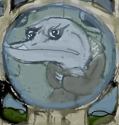|
shallowj posted:this isn't going to be true forever, right? wouldn't drones be capable of maneuvers that would kill/incapacitate human pilots (from G forces)? what's the "bottleneck" right now for drone performance? software? bandwidth?
|
|
|
|

|
| # ? May 21, 2024 04:09 |
|
shallowj posted:this isn't going to be true forever, right? wouldn't drones be capable of maneuvers that would kill/incapacitate human pilots (from G forces)? what's the "bottleneck" right now for drone performance? software? bandwidth? You don't need to make a drone good enough to fight any human 1v1, you just need to get drones cheap enough such that for every human pilot, you have like 10 or 20 drones. Even if a human is capable of taking out 5 drones, 10 more will kill them and then you still have 5 drones and they have no more pilots.
|
|
|
|
Missiles. Those are called missiles.
|
|
|
|
It seems to me that if you can make a drone for a quarter of the cost of an aircraft, and then instead of having weapons the drone is literally just a massive remote piloted missile that kamikazi's into the enemy plane, you're winning.
|
|
|
|
|
Slavvy posted:It seems to me that if you can make a drone for a quarter of the cost of an aircraft, and then instead of having weapons the drone is literally just a massive remote piloted missile that kamikazi's into the enemy plane, you're winning. The difference is, sometimes dumb poo poo happens and a someone or something fucks up. If it's a missile, it doesn't hit and is lost. If it's a human, he's dead, if it's a drone, it's destroyed. But a missile is also destroyed if it hits, a drone at the worst just expends its ammunition, like a jet with a human pilot minus the pilot. So in your example, those missiles are lost even if their winning the fight, since they'll hit their targets and explode. If a non-kamikaze drone somehow survives and kills a pilot, the drone is still there and can be send out again. So drones > missiles in this scenario.
|
|
|
|
Slavvy posted:It seems to me that if you can make a drone for a quarter of the cost of an aircraft, and then instead of having weapons the drone is literally just a massive remote piloted missile that kamikazi's into the enemy plane, you're winning. Itís not the people related parts that make advanced jets expensive. A drone capable of tangling with an F-22 is going to be just about as expensive. Things like the sensors, engines, stealth design and avionics are all going to be expensive and then you add having to develop either the capability for the AI to fight autonomously (super expensive) or a way to allow them to be remotely piloted effectively in that environment (also expensive). Capable drones arenít cheap or expendable.
|
|
|
|
And you can bet your dollar's that the Chinese and ussr are researching ways to jam the gently caress out of drones.
|
|
|
|
vuk83 posted:And you can bet your dollar's that the Chinese and ussr are researching ways to jam the gently caress out of drones. The what now?
|
|
|
|
The limitations in operator situational awareness and the delay in control caused by the link are the big limitations; neither is going to be overcome in the very near future. UAS can only really be utilized doing predictable things that don't require much maneuvering and certainly not much quick reacting.
|
|
|
|
Hogge Wild posted:The what now? I think he meant the Russian Federation and accidentally slipped back into the 80s.
|
|
|
|
The thing about drones is that for first world societies with open media and at least some level of government answerable to public sentiment combat losses (or even just inconveniencing decent numbers of people via deployments etc) eats up a shitload of political capital really, really fast. Drones? Not so much. It's never going to be an either/or proposition (at least probably not in our lifetimes) but the sheer expendability of drones vs. piloted aircraft from the PR perspective makes them a lot easier to employ. No grieving widows if a drone gets popped, no embarrassing negotiations to get back captured pilots, and the common public perception (regardless of the reality) is that drones cost somewhere between an expensive missile and a super-cheap aircraft, so losing a bunch isn't even going to start a huge financial outcry. In the US at least you can blow through $1B worth of munitions to kill a handful of ISIS fighters and generate a collective shrug, but holy gently caress video of a bunch of Somalis dragging two dead helicopter pilots through the streets will start a political crisis. For that reason alone - the relative ease with which drones can be deployed with regard to domestic politics - they're here to stay.
|
|
|
|
Cyrano4747 posted:For that reason alone - the relative ease with which drones can be deployed with regard to domestic politics - they're here to stay. Strongly agree. As I see it, the catalyst for a significant anti-war movement is generally deaths of "soldiers from our country". For most people, deaths of non-countrymen are somewhere on the spectrum from "only understood intellectually" to "meaningless". If soldiers from Our Country aren't in danger, who cares?
|
|
|
|
Its pretty expensive to train a pilot so I'd think without even considering the political cost even the most expensive drone saves you losing that investment.
|
|
|
|
^^ Well poo poo, beaten. Plus, if an aircraft goes down, you lose all the time and money spent training the pilot and need to spend at least that much more to train another to take his place. If a drone goes down, the operator is still here to fly another day.
|
|
|
|
100 Years Ago The West: The Germans continue making steady progress towards Arras, but French reinforcements are arriving in the area, and make them pay a fair price for the ground they capture. Antwerp continues to be worn down; the Royal Naval Division takes ship, and is rather surprised to discover that they will be sailing to Dunkirk, not Antwerp. Anyone who doesn't know want to hazard a guess at why this might be? Antwerp itself is still under pressure, but western Belgium is still a mostly German-free zone; they're concentrating on the outer forts, which will likely hold out long enough to sail there. The East: Steady German progress towards the Vistula and Warsaw behind it. The Russians are unable to concentrate enough power at any one point to become a serious obstruction. Both sides begin massing cavalry to try to tip the balance in one direction or another. The Austro-Hungarians also begin laying plans for an offensive against the weakened Serbs that will hopefully take Belgrade before winter sets in. Discipline in the BEF, part 2. (Here's Part 1.) We're still deep in the Manual of Military Law, the world's largest crib-sheet, succinctly summarising and interpreting the many reams of statute that together made up "military law", for the benefit of harassed officers who found themselves in need of a quick refresher. The last post made frequent mention of soldiers being put on a charge; let's now look into what military offences they could actually be charged with. To begin with, a soldier remained entirely subject to the ordinary law, aside from anything that military law had to say. A man who committed an offence against the ordinary law could only be dealt with an ordinary court, unless committed the offence while on active service, or more than 100 miles from the nearest civil court. 39 men were executed during the war after being convicted of murder by a court-martial (18 more than were executed for the offence of cowardice, of which more later). FGCMs also dealt with a large number of cases of theft, a crime that the Army viewed with complete contempt, as it does today (because you have to trust your mates completely, and it's hard to do that when your poo poo goes walking off if you leave it alone with them; but of course, criminal theft of personal property is something completely different to the simple and harmless acquisition of a decent buckshee from someone who's a bit slow on the uptake). (A soldier who kills in the execution of his duty does not commit murder, because the homicide must be done unlawfully and against a person subject to the King's peace, which doesn't apply to an enemy during wartime, and a soldier may therefore be issued with a lawful order to kill.) There were, incidentally, a large number of rumoured cases (and a small number of cases for which there is at least some evidence stronger than latrine rumours) of unpopular officers and NCOs being deliberately killed by their men. Fragging is, as you might expect, not something invented by the US Marine Corps in Vietnam, and was relatively easy to get away with as long as it was done with sufficient forethought. A shell comes over, an explosion goes up, a bullying sergeant is left in pieces. Nobody's going to be going around with a magnifying-glass, looking to establish the precise cause of death. The best place to hide a leaf is in the forest. So to the purely military offences (the relevant section of the Army Act 1881 is reproduced beginning page 267 of the Manual). These are divided into three categories; offences always (potentially) punishable by death (very few, mostly mutiny and sedition), offences never punishable by death (most of them), and then a tricky middle category, the bit a lot of soldiers failed to notice, which was offences that were punished more severely when committed on active service than at other times. The classic example of such an offence would be sleeping at a post. It's easy to see why military law might consider this a minor failing in a boring peacetime garrison, punishable by a spell in the guardroom with loss of pay at the worst; but the most serious of crimes, potentially punishable by death, when committed by a soldier who was supposed to be monitoring No Man's Land for signs of an enemy raid or attack. The worst offences of all were of course mutiny and sedition, which need very little explanation (only that failing to report or suppress mutiny or sedition was considered equal to actively committing it). The next ones to look at are the "assisting the enemy" charges; shamefully abandoning a position, shamefully casting away one's arms or equipment, treacherously corresponding with the enemy, deliberately aiding the enemy, serving the enemy's army when a prisoner, and showing cowardice in the face of the enemy. These were always punishable by death, "or other such less punishment as is in this Act mentioned" (the only crimes that a court-martial did not have discretion for sentencing were civil offences that required death, such as murder). It's very interesting that all of those crimes have some element of hedge and wriggle room to them; cowardice had to be shown in the face of the enemy, and charges of cowardice often led to very difficult decisions for a court-martial as they tried to distinguish legitimate fear from illegitimate cowardice (this is why cowardice soon fell out of favour as a charge, being mostly replaced by other offences which were far more based in facts than in the defendant's state of mind). The word "shamefully" appears twice, to distinguish the rare cases of unwarranted panic from everyday situations where men would be forced to give up an untenable position; and only the man in direct charge of a post could shamefully abandon it, and it is defined as "a positive and disgraceful dereliction of duty, not merely through negligence, misapprehension, or error of judgement". Next we find a list of serious offences that could never be punished by death, and it's surprisingly wide. Leaving the ranks without order to secure prisoners or horses, or taking wounded men to the rear (that's what stretcher-bearers are for); wilfully destroying or damaging property without order; being taken prisoner because of disobedience or negligence, or failing to take an opportunity to escape when held prisoner; corresponding with the enemy (not in a treacherous fashion); and deliberately spreading alarm or despondency. Then come the offences punished more severely on active service. Going in search of plunder; breaking into a house in search of plunder; leaving a post or patrol without orders; forcing past or striking a sentinel; impeding the provosts or military police; deliberately causing a false alarm or signal; treacherously giving away passwords; inappropriate appropriation (that's almost what it actually says) of supplies; sleeping at a post, or being drunk at a post, or leaving it without relief. Now we start to encounter offences that are more based in fact. You don't have to prove a shameful intent to convict someone of being drunk in the trenches; just that he was drunk. A "post" was defined as a specific place that a man had a duty to be at, particularly one where a man was appointed to duty and then left to get on with it; exactly what constituted a post was left to the military knowledge of the court, and details of the post had to be included in the charge. There then follows a couple of offences of similar character; first, that of striking a superior officer in the execution of his office, which was an "active service" offence. Simply striking a superior was not eligible for death; it had to occur while the superior was doing his duty. Likewise, failure to obey an order in a way that showed wilful disobedience was an "active service"; simple failure to obey was not. And then there comes desertion, another "active service" offence. Again, it has a very particular definition. "It is necessary to prove...that the accused intended not to return to military duty in any corps, or intended to avoid some important particular service..." The part in emphasis shows rather neatly why desertion soon became the charge preferred over cowardice. Private Jones is ordered to participate in an attack on a machine-gun post, but doesn't join his fellows and instead goes to hide in a shell-hole, joining the men when the attack is ended. You can haggle over whether he was being cowardly, or go for desertion, which is based mostly in the facts of an event, rather than in the defendant's mind alone. This quickly became an acceptable definition of "avoiding some important particular service", and the need to prove cowardice was avoided. Being absent without leave was a separate offence, for the frequent cases where no particular service was avoided and the accused could show an intent to return; this was such a minor and common offence that it was very frequently dealt with summarily by colonels and majors. Desertion in the more common sense of doing a runner from one's unit and intending never to come back was a serious problem for the BEF as the war wore on (har har har), and was a major driver for the continued use of death sentences (usually suspended and commuted ones) against charged deserters. There's some pretty great stories about what some of the more intelligent and premeditated deserters got up to, of which more later. Then we have the miscellaneous and the actual charge-sheet fillers. General drunkenness, guards who allow guarded persons to escape, escaping lawful confinement, and the ever-popular conduct prejudicial to good order and discipline, the military equivalent of a breach of the peace (necessary because there's often precious little of the King's peace near the Army...). And then the final offences are rare, amusing or sad. Embezzlement; theft; officers behaving scandalously, in a manner unbecoming of an officer and a gentleman (no, really, that's what it says); deliberately injuring oneself or another; failing to obey medical advice and aggravating an injury or disease; falsifying information; taking bribes; failing to send reports as required; using traitorous or disloyal words towards the King; fighting a duel; and a thousand and one other such things...
|
|
|
|
Trin Tragula posted:There's some pretty great stories about what some of the more intelligent and premeditated deserters got up to, of which more later. This sounds particularly interesting, I'm looking forward to it.
|
|
|
|
So for an overall history of the American Civil War, Foote is still the way to go right?
|
|
|
Shimrra Jamaane posted:So for an overall history of the American Civil War, Foote is still the way to go right? McPherson for a single volume, Foote if you've got the time and inclination for a deeper dive.
|
|
|
|
|
Do either books go into the political leadup or does it basically start at Sumter?
|
|
|
|
Foote starts with a biography of Lincoln and Davis and then opens towards the very end of Buchanan's presidency IIRC.
|
|
|
|
The first third of Battle Cry is all political build up.
|
|
|
|
Shimrra Jamaane posted:Do either books go into the political leadup or does it basically start at Sumter? The first quarter or so of McPherson's book goes into the political, economic, and social foundations of the war.
|
|
|
|
Shimrra Jamaane posted:Do either books go into the political leadup or does it basically start at Sumter? McPherson starts pre-Zachary Taylor. It's all you really need for a single volume. Also its like either almost or more than 1000 pages.
|
|
|
|
ALL-PRO SEXMAN posted:McPherson starts pre-Zachary Taylor. It's all you really need for a single volume. Also its like either almost or more than 1000 pages.
|
|
|
|
The first third of "Battle Cry of Freedom" is maybe my favorite piece of historical writing ever. It is beautifully written but still concise, objective, accurate, focused, and entertaining. It really is more than just a ACW book, it is a brief history of the postcolonial US. It is simple enough for high school students to read; when I was teaching a Civil War course I used just that part of the book as our text for the prewar era. Foote doesn't go much into the politics before the war; he wanted to write about the soldiers, the leaders, the battles, daily life, etc. His writing style is superb and I generally think his analysis of the leaders and battles is spot on but it is more difficult to read than McPherson. I've also always appreciated how he presented the more maligned characters of the war (Davis and McClellan come to mind immediately), trying to get into their minds a little bit and showing things from their perspective, rather than just pointing out their inadequacies and/or the flaws in their perspectives.
|
|
|
|
And yet that still didn't get me to not want to yell at a long dead McClellan every time Foote covered one of his many fuckups.
|
|
|
|
Raskolnikov38 posted:And yet that still didn't get me to not want to yell at a long dead McClellan every time Foote covered one of his many fuckups. McClellan is an interesting guy because he never hosed up because he was overly ambitious or a butcher, almost all of his fuckups were actually a result of trying to not gently caress up.
|
|
|
|
What made McClellan great at building an army, his imagination and cautious nature that allowed him to anticipate problems and train or supply around those problems in advance, was the same thing that made him poo poo at leading his army, because that same imagination conjured up vast Confederate armies where none existed and his cautious nature made him run away from battles he should have won.
|
|
|
|
|
He's very odd because he had so much ego and ambition, but at the same time was extremely cautious and fearful. It's easy to understand why his political opponents thought he secretly wanted the South to win the war.
|
|
|
|
The McClellan years are pretty much summed up by that time Lincon worked out the casualty rates for all the battles in Virginia and realised that in pure numbers terms in any of the battles the Union lost they would have easily won if they had just stood and fought it out.
|
|
|
|
Really what I want to yell at McClellan about is his inability to either read a map or the lay of the land. He puts his army into the worst spots for battles and then when Lee finally gets cornered in Antietam he can't see that an overwhelming flanking attack on his left will bottle up the Army of Northern Virginia inside the town for its destruction.
|
|
|
|
Speaking of McPherson, here's his article for the NYT Sunday Book Review that came out yesterday: http://www.nytimes.com/2014/10/05/books/review/james-m-mcpherson-by-the-book.html?_r=0
|
|
|
|
vuk83 posted:And you can bet your dollar's that the Chinese and ussr are researching ways to jam the gently caress out of drones. I'd be worried about spying/espionage. Imagine a scenario where your air force is all heavily armed drones and someone figures out how to p0wn them and control them themselves. You could get some literal Galactica poo poo going on.
|
|
|
|
Rodrigo Diaz posted:Speaking of McPherson, here's his article for the NYT Sunday Book Review that came out yesterday: http://www.nytimes.com/2014/10/05/books/review/james-m-mcpherson-by-the-book.html?_r=0 He thinks Jean Edward Smith's Grant biography was good? Ugh. That book lifts stuff straight out of Catton and McFeely. Good on him for reading Chernow though. Battle Cry of Freedom is 30 years old, and I wish somebody would publish a new one-volume history to replace it. There's been a ton of scholarship since 1988, and the Civil Rights era historiography that McPherson represents has been left behind by a lot of it.
|
|
|
|
Speaking of Catton, I love his stuff on the Civil War but he's rarely mentioned in the thread when recommendations come up. Has he been superseded by modern research or is he just old hat nowadays ? Or, is Foote that much better of a writer ?
|
|
|
|
mllaneza posted:Speaking of Catton, I love his stuff on the Civil War but he's rarely mentioned in the thread when recommendations come up. Has he been superseded by modern research or is he just old hat nowadays ? Or, is Foote that much better of a writer ? Both, I think. Catton inspired a lot of popular Civil War historians, McPherson and Foote included. Foote had a big advantage in that he wrote (mostly) later than Catton and lived long enough to get into Ken Burns' documentary, which definitely helped his popularity. EDIT: In terms of research, there's a ton that Catton (and Foote) didn't have access to. The US Grant papers only started getting compiled in 1964, and were only 'finished' in the last decade, for example. dublish fucked around with this message at 19:16 on Oct 3, 2014 |
|
|
|
dublish posted:He thinks Jean Edward Smith's Grant biography was good? Ugh. That book lifts stuff straight out of Catton and McFeely. Good on him for reading Chernow though. that's cool to know tbh
|
|
|
|
feedmegin posted:I'd be worried about spying/espionage. Imagine a scenario where your air force is all heavily armed drones and someone figures out how to p0wn them and control them themselves. You could get some literal Galactica poo poo going on. This is the big thing now. Major powers aren't going to get in a face to face dick waving like years ago. Anything the military wants to know about China or *laughs* Russia can be found out via other means than drones unless it's a full on conflict and troops need to know the location of another group of troops. Instead it's all cyber warfare.
|
|
|
|
100 Years Ago French troops are pouring hodge-podge into the line in front of Arras. Further attacks are made and some more ground lost, but at heavy cost to the invaders, who are turned back from the suburbs and forced north. A salient begins to develop around the town. Both sides are confused and disorganised, having travelled long distances and gone quickly into combat, and communications are poor. Neither side realises that the German movement to the north of Arras and consequent hasty redeployments have left a yawning gap in the French line. Meanwhile, the Royal Naval Division lands at Dunkirk and boards the slow train towards Antwerp. It's a major seaport, but like London, it's located many miles inland. Antwerp's river is the Schelde, and the mouth of the river belongs to the Netherlands, who are still firmly neutral, and after seeing what the Germans have been doing in Belgium and France, they have absolutely no desire to give up their neutrality and invite the German army in. The fleet could in theory just have blown a large raspberry at the Dutch and sailed through regardless, but this violation of their neutrality would have been a gigantic birthday, Christmas, New Year and Easter diplomatic and propaganda gift for the Germans all at once (given that Britain went to war to defend Belgian neutrality); so the Division must take the scenic route, the defences at Antwerp gradually deteriorating all the while. In the East, a minor action occurs at Opatůw, between the retiring Russians and advancing Germans and Austrians, still some distance west of Warsaw. It's not entirely unlike several small actions during the retreat from Mons; a small force proves very annoying to its opponents for far longer than their numbers would suggest, and then gets out of it sharpish, covering everyone else's retirement in the process. However, due to circumstances that appear to be a Matter of Some Debate, some Russian infantry finds themselves making a stand where they are instead of continuing to retire.
|
|
|
|

|
| # ? May 21, 2024 04:09 |
|
SocketWrench posted:This is the big thing now. Major powers aren't going to get in a face to face dick waving like years ago. Anything the military wants to know about China or *laughs* Russia can be found out via other means than drones unless it's a full on conflict and troops need to know the location of another group of troops. Instead it's all cyber warfare. Uh...HUMINT, SIGINT, ELINT, IMINIT, and a host of other intelligence-gathering methods are being used by (and against) major powers. Cyber is just the tip of a very large intelligence iceberg. As for dick waving, that's very much a thing. Look at the South China Sea and all the posturing over the ADIZ. Or Russia repeatedly sending Tu-95s into Western European airspace. vuk83 posted:And you can bet your dollar's that the Chinese and ussr are researching ways to jam the gently caress out of drones. Sure, they'd be foolish not to. But not all drones are vulnerable to "jamming." You could jam the command signals of an remotely-pilot vehicle (RPV) something like a Reaper or a Predator. Or you could try to spoof other signals. The RQ-170 forcedown wasn't "jamming" per se (irrc, it spoofed GPS signals to force the drone down). But for more autonomous stuff like Global Hawk, that might not be as feasible to do.
|
|
|





















 Yes, it's like a lava lamp.
Yes, it's like a lava lamp.




















